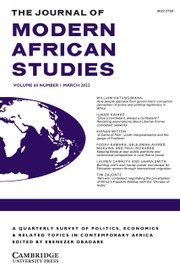
How should one read political and historical literature on modern authoritarianism, neopatrimonialism, and state formation in Africa from a Ugandan vantage point? This is the central theoretical question that Rebecca Tapscott asks in this new study on the postcolonial state in Uganda. In eight chapters, Tapscott navigates the ‘micro-dynamics of governance in Uganda’, in which she identifies a variety of modern authoritarianism thought to be peculiar to Museveni's Uganda: ‘institutionalized arbitrariness’. Based on four years of fieldwork in the Gulu, Moroto, Soroti, and Mbarara areas of Uganda between 2014 and 2018, Tapscott claims that unlike with typical African ‘neopatrimonial states’, where power is projected through ‘patron-client relations’, the main objective in Uganda's institutionalized arbitrariness is to undermine ‘threats to its authority (3). The point is to ‘embed the regime not just in the state but also in society (200).
The book presents and analyses four major oppositions salient to institutionalized arbitrariness: the use of lawful vs. exceptional violence; the state's jurisdictional claims vs. lack thereof; state presence vs. its absence; and fragmentation vs. consolidation (11f, 199). These are discussed throughout the book. After the Introduction, Chapters 2 and 3 respectively explore theoretical and historical aspects of institutionalized arbitrariness in Uganda. Chapters 4, 5, and 6 deal with cases of Uganda police, vigilantes, and crime preventers respectively, and their relationship to the build-up of institutionalized arbitrariness. In turn, Chapter 7 explores the varieties of arbitrary governance in the four Ugandan contexts that Tapscott studied (Gulu, Soroti, Moroto, and Mbarara), while in the last chapter, Tapscott aims at stretching her theory of institutionalized arbitrariness to other African contexts, starting with Ethiopia, Rwanda, and Zimbabwe. It is this latter attempt that seems to distinguish Tapscott's institutionalized arbitrariness as a typically African phenomenon.
In the study of Africa, this book makes a contribution to the literature on neopatrimonialism. Its major claim is that the character of the state in Museveni's Uganda does not fit into the blueprint of mainstream neopatrimonialist literature – thus Tapscott's coinage of ‘institutionalized arbitrariness’. This internal critique of neopatrimonialism and literature on state formation in Africa, however, does not meaningfully engage literature that critiques the theoretical certitudes that inform knowledge produced by neopatrimonialist thinkers. At times, this exclusive, closed intra-engagement, critical as it is, leads the author to read radical critics of neopatrimonialism as also part of the neopatrimonialism school – to use Thandika Mkandawire's notion. The most notable example is that of Mahmood Mamdani, who the author pairs with the likes of Jean-François Bayart while reviewing literature (16). Thus, where Mamdani (Citizen and Subject, Princeton University Press, 1996) talks of the legacy of late-colonial political modernity, Tapscott reads ‘legacies of neopatrimonialism’, and where Mamdani talks of the colonial bifurcated state, Tapscott reads postcolonial neopatrimonial bifurcated state (49f). Wittingly or otherwise, the tendency here is to flatten the diversity of literature on the postcolonial state, and to suppose that all are varieties of neopatrimonialism.
Early in the book, Tapscott rightly notes that ‘arbitrary governance is indeed tied to historical factors, such as the postcolonial nature of the state’ (10). The book's historical chapter (Chapter 3), however, surprisingly locks the debate to the postcolonial period. If the distinctive feature of the state in Africa is its postcolonial nature, what is the place of colonial political modernity in the emergence of institutionalised arbitrariness? Asking such a question would definitely imply approaching this book's research object differently, and questioning knowledge produced through a conception of postcolonial temporality as the beginning of time. Overall, if this book's major downside is its limited historicisation of the state in Uganda, its strength is in its detailed engagement with various manifestations of state power in contemporary Uganda. In the latter, Tapscott makes an important contribution.
| File Name | div-class-title-span-class-italic-arbitrary-states-social-control-and-modern-authoritarianism-in-museveni-s-uganda-span-by-rebecca-tapscott-oxford-oxford-university-press-2021-pp-256-100-hbk-div.pdf |
|---|---|
| File Type | |
| File Size | 153.81 KB |
| Total Downloads | 1,439 |
| Download |

